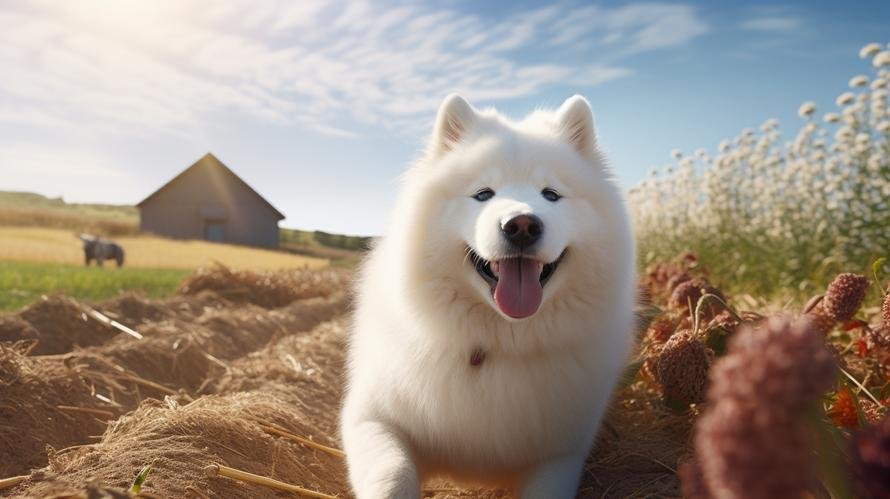It was an icy day in Siberia when Russian explorer Ernst Killander stopped to rest and enjoy his lunch – a small collection of meats and bread. As he began to unwrap his food, a snowy nose poked out from behind a tree. Killander froze, unsure of the creature’s intent but certain that he was not ready for confrontation. Instead of a growl, however, what came next was a doe-eyed, waggy-tailed ball of gorgeous white fur apparently interested only in his salami sandwich. It was Killander’s first encounter with the Samoyed, a breed he would later describe as being “filled with fun, friendliness and a surprising amount of intelligence.” He couldn’t have been further from the truth.
The Samoyed, beloved for its brilliant white coat and ever-smiling face, has been charming dog enthusiasts across the globe since time immemorial. But beyond their alluring charm and beauty, is a Samoyed a healthy dog?
The answer to that lies not merely in a yes or no, but a deep dive into understanding the breed’s genetic makeup, its behavioral characteristics, predisposed health conditions, and the lifestyle it leads. All these aspects have a significant role in determining not just the physical health but the overall wellness of any breed, and Samoyeds are no different.
A Glimpse from History
To peg the Samoyed as a healthy breed, it helps to understand its history. These cheerful fluff balls share a rich and resilient ancestry, tracing back to the nomadic reindeer herding communities in the formidable terrains of Siberia. For over a thousand years or more, Samoyeds were constant companions to the Samoyedic tribe, carrying heavy loads, towing sledges, keeping children warm, and even joining hunting expeditions in freezing weather.
Consequently, the Samoyed as a breed evolved as sturdy and robust dogs, with a constitution strong enough to help them survive even the harshest of Siberian winters. This powerful ability to withstand severe conditions could be a contributing factor to their robust health.
Understanding the Breed-Specific Health Conditions
Like every other breed, Samoyeds too have certain conditions they are genetically predisposed to. Hip dysplasia, a common issue observed in large dogs, is the primary concern for Samoyed parents. Although it’s not an exclusive Samoyed illness, the breed’s genetic predisposition makes it a condition worth noting.
Another commonly reported health concern is progressive retinal atrophy, a degenerative eye disorder. This is why routine vet checks are crucial to maintaining a Samoyed’s health. Besides these, Sammies are also prone to certain heart conditions and have a high possibility of developing diabetes later in life.
Despite these predispositions, this doesn’t mean that every Samoyed will suffer from these ailments. With proper care, regular check-ups, and a quality diet, the chances significantly decrease.
Fuel Matters
One of the wise ways to maintain and improve a Samoyed’s health is through diet management. It’s pivotal to give these active dogs a diet rich in protein since they come from a lineage of hard-working dogs.
However, their calorie intake should reflect the amount of exercise they get. Obesity is a risk that can lead to further complications such as diabetes. So, ensuring they maintain a balanced weight while fueling their activity levels is super important.
Grooming Galore
Did you know that grooming doesn’t only make a Samoyed look charming, but it also promotes their health? Their stunning white coats act as their protective shields, with a dense undercoat and longer guard hairs. Regular grooming helps keep their skin healthy, reduces the chances of infections and allergies, and encourages better temperature regulation, especially in warmer climates.
Love and Attention
Finally, Samoyeds are social animals who thrive on attention. So, their mental health is just as crucial as their physical health. Continuous interaction, playtime, and training sessions are part of a Samoyed’s essential health regimen.
To sum it all up, yes, Samoyeds are pretty healthy dogs, and their resilient genetic makeup and jovial personality can vouch for this. However, they’re not immune to health conditions either.
It’s essential to remember that owning a Samoyed comes with responsibilities, such as regular vet check-ups, maintaining a balanced diet and grooming routine, and providing ample love and attention.
Just as the nomadic Samoyedic people trusted and cared for their Samoyeds, forming bonds that stood the test of time and harsh Siberian winters, modern dog-owners can create a loving environment for their Sammies. With this careful consideration, your fluffy friend will not only be a picture of glowing health but also a loyal companion for life.



